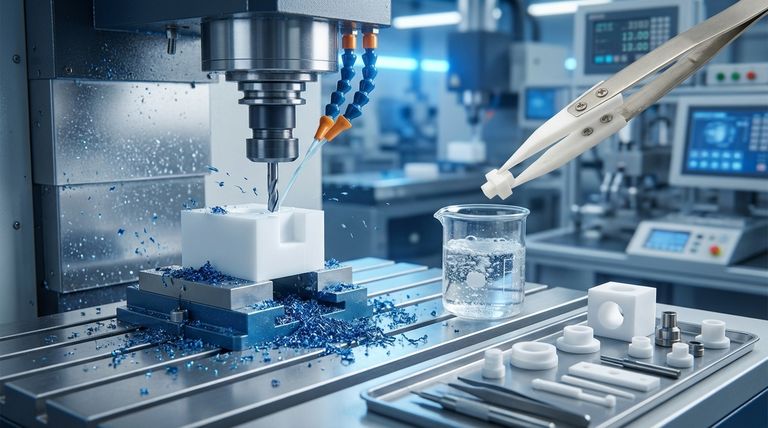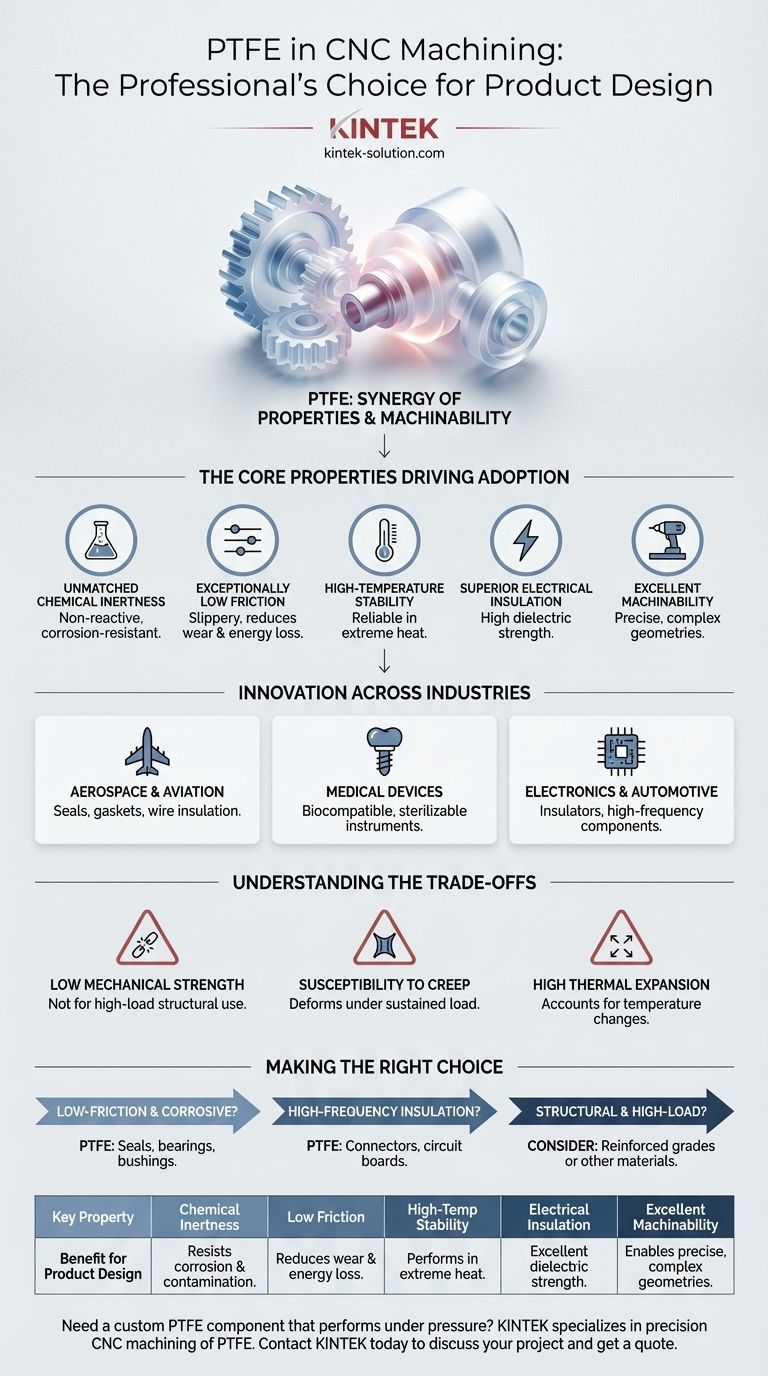At its core, Polytetrafluoroethylene (PTFE) is preferred in CNC machining because it offers a rare combination of exceptional material properties and excellent machinability. Its unique characteristics—including extreme chemical resistance, a very low friction coefficient, and high-temperature stability—allow designers to create highly precise and complex components that can perform in environments where most other materials would fail.
The true value of PTFE in product design isn't just one of its famous traits, but the synergy of all of them. It is a specialized problem-solving material, enabling the creation of custom parts that must simultaneously resist chemicals, reduce friction, and insulate against electricity or heat.

The Core Properties Driving PTFE's Adoption
To understand why PTFE is so valuable, we must look at the specific material characteristics that engineers leverage during the design process. These properties are not just beneficial; they are often critical for the application's success.
Unmatched Chemical Inertness
PTFE is non-reactive and resistant to nearly all industrial chemicals, acids, and bases. This makes it an essential material for components used in chemical processing, medical devices, and the food industry.
Because of this inertness, components made from PTFE will not corrode, degrade, or contaminate the substances they contact.
Exceptionally Low Coefficient of Friction
Often cited as one of the lowest of any solid material, PTFE's coefficient of friction gives it a "slippery," non-stick quality. This is invaluable for creating high-performance bearings, seals, and liners.
This property reduces wear and energy loss in moving parts, enhancing the efficiency and longevity of the final product.
High-Temperature Stability and Resistance
PTFE maintains its integrity across a wide range of temperatures. It can perform reliably in demanding environments found in aerospace, automotive engines, and industrial machinery where extreme heat would degrade other plastics.
Superior Electrical Insulation
PTFE is an excellent electrical insulator with high dielectric strength, meaning it can withstand a strong electric field without breaking down. This makes it a critical material for insulators, connectors, and components in high-frequency electronics.
Excellent Machinability
Despite its unique properties, PTFE is a relatively soft material that is easy to machine. CNC mills and lathes can cut it to extremely tight tolerances, enabling the creation of intricate geometries and complex parts with high precision and repeatability.
Where These Properties Translate to Innovation
The combination of these traits makes CNC-machined PTFE a go-to choice for solving specific challenges across several high-stakes industries.
In Aerospace and Aviation
In aerospace, components must be lightweight yet durable and capable of withstanding extreme conditions. PTFE is used for seals, gaskets, and wire insulation that require high performance and reliability.
In Medical Devices
PTFE's biocompatibility means it does not react with bodily fluids, and its ability to withstand sterilization processes like autoclaving makes it ideal. It is used for surgical instruments, implants, and fluid-handling components.
In Electronics and Automotive
Within electronics, PTFE is used to insulate high-frequency cables and connectors, protecting signal integrity. In automotive applications, its low-friction and heat-resistant properties enhance the durability and performance of seals and bearings.
Understanding the Trade-offs
While its advantages are significant, PTFE is not a universal solution. An objective assessment requires acknowledging its limitations.
Relatively Low Mechanical Strength
PTFE is a soft material with low tensile strength and stiffness compared to engineering plastics like PEEK or metals. It is not suitable for purely structural or high-load-bearing applications without reinforcement (e.g., glass or carbon-filled grades).
Susceptibility to Creep
Under a constant, sustained load, PTFE can slowly deform over time—a phenomenon known as "creep." This must be carefully considered in the design of seals and gaskets that will be under constant compression.
High Thermal Expansion
PTFE has a higher coefficient of thermal expansion than many other engineering materials. Designers must account for how much a part will expand or contract with temperature changes to maintain critical tolerances.
Making the Right Choice for Your Design
Selecting PTFE should be a deliberate decision based on the specific demands of your product. Its unique profile makes it an ideal solution for certain problems and unsuitable for others.
- If your primary focus is low-friction performance in a corrosive environment: PTFE is an unparalleled choice for seals, bearings, bushings, and chemical-resistant liners.
- If your primary focus is high-frequency electrical insulation: PTFE's dielectric properties make it a superior material for connectors, insulators, and circuit boards.
- If your primary focus is structural integrity under high mechanical load: You should consider a different material or specify a filled/reinforced grade of PTFE to improve its strength and rigidity.
Ultimately, PTFE is the material of choice when your design requires high performance in extreme chemical, thermal, or electrical environments.
Summary Table:
| Key Property | Benefit for Product Design |
|---|---|
| Chemical Inertness | Resists corrosion and contamination in harsh environments. |
| Low Friction | Reduces wear and energy loss in moving parts like bearings and seals. |
| High-Temp Stability | Performs reliably in extreme heat where other plastics fail. |
| Electrical Insulation | Excellent dielectric strength for high-frequency electronics. |
| Excellent Machinability | Enables precise, complex geometries with tight tolerances. |
Need a custom PTFE component that performs under pressure?
KINTEK specializes in precision CNC machining of PTFE for the semiconductor, medical, laboratory, and industrial sectors. We leverage PTFE's unique properties to manufacture high-performance seals, liners, labware, and other critical components.
Whether you require prototypes or high-volume production, our expertise ensures your parts meet the exact demands of your application.
Contact KINTEK today to discuss your project and get a quote.
Visual Guide

Related Products
- Custom PTFE Parts Manufacturer for Teflon Parts and PTFE Tweezers
- Custom PTFE Parts Manufacturer for Teflon Containers and Components
- Custom PTFE Teflon Balls for Advanced Industrial Applications
- Custom PTFE Measuring Cylinders for Advanced Scientific and Industrial Applications
- Custom PTFE Square Trays for Industrial and Laboratory Use
People Also Ask
- What industries use PTFE machined parts and for what applications? Critical Components for Demanding Environments
- What are the future considerations for machining Teflon? Mastering Material Challenges with Smart Tech
- What are the best practices for achieving tight tolerances in Teflon (PTFE) machining? Master Precision for Demanding Applications
- What are the key advantages of PTFE? Unmatched Performance for Extreme Environments
- Why is CNC machining preferred for Teflon parts over other methods? Unlock Precision & Complex Designs



















